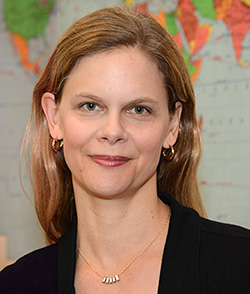
YaleNews
Starting this year, the highly selective Studies in Grand Strategy program will broaden its original focus to include deeper academic inquiry into activism and social movements.
The Brady-Johnson Program in Grand Strategy confronts big-picture questions of politics and social change. The program’s central course is a graduate-level seminar that selects a small set of graduate, undergraduate and professional students to analyze the past and present with the goal of fostering a class of future leaders. The course once mainly tackled geopolitics and diplomacy, but under the direction of history professor Beverly Gage ’94, who was appointed as head of the program in 2017, the course now places a larger emphasis on the study of social movements. The program’s fall 2019 syllabus featured a unit on US politics and social change as well as a book on how to defeat the NRA.
“Even if you’re going into one of the very traditional realms of diplomacy or military affairs, you really can’t understand your job in this day and age without understanding what’s happening at the grassroots,” Gage said about the course’s modified focus.
The year-long course includes two semesters of classroom work, a summer research opportunity or internship and numerous other opportunities to learn from eminent scholars, journalists and politicians. Professors Charles Hill, John Gaddis and Paul Kennedy founded the program in 2000. According to Hill, the University’s lack of interdisciplinary courses was the professors’ impetus for creating the program.
The three founders have neighboring offices in 31 Hillhouse and crafted the program “over the back fence” of their offices, Hill said. The course primarily tackled issues of statecraft, geopolitics and diplomacy in its early years.
The original set-up was linked to the founders’ own focuses. The three professors spanned the political spectrum and areas of academic expertise. “We were able to kind of make fun of each other in class because of our different political angles,” Hill said.
The program inevitably had to expand its focus because the area of study was so closely tied to the three founders themselves, according to Hill. In 2017, Gage was named program director, taking over for the founders who are no longer active in the program.
The number of applicants to the course has remained relatively steady, with around 100 students applying for 20 coveted spots, a decrease from years past at which the class at times had nearly 50 students. The program now attracts a wider range of students, according to Gage.
Christian Wolpert ’20, who has not enrolled in the course, said that the course’s shift in focus made him less interested in the program. Wolpert explained that the program’s original structure “actually seemed to prepare for the leaders of tomorrow.” He added that in contrast, the course’s current form is more focused on marketability and preparing students for “consulting, the banking world.”
Gage explained that intelligent, forward-thinking strategy can apply to geopolitics as well as social change. In almost any “geopolitical hotspot,” there is some combination of high diplomatic action and pressure from below in the streets, Gage said. She pointed to activism in Iran, Iraq and Hong Kong.
She noted that some students interested in grassroots social change do not consider larger questions of long-term strategy to bring about the fundamental change they desire.
“They don’t tend to think very seriously about strategy and really ask questions about ends and means, about how you’re going to get to where you want to be,” she said. “I think they also have a lot to learn from the more traditional realms of strategic thinking in war and diplomacy.”
Still, some past and present students have gladly welcomed the new curricular changes. Arka Gupta ’20, a former Studies in Grand Strategy student, said the course gave him the insight to differentiate between problems with quick solutions and longer-term challenges inherent to the economic and political landscape.
The focus on social issues drew Gupta to the program.
“Its recent shift to incorporate global health and social movements appealed to my interest in leveraging strategy to reduce overdose deaths in the opioid crisis,” Gupta wrote in an email to the News.
For example, Gupta said the program revolutionized his understanding of the opioid epidemic and helped him see the link between the crisis and larger issues of socioeconomic inequality.
“This is very much a class that’s about how you’re going to go about making the kind of change you’d like to see,” Gage said.
The Brady-Johnson Program in Grand Strategy was inaugurated in 2006 by University President Richard C. Levin.
Rose Horowitch | rose.horowitch@yale.edu







